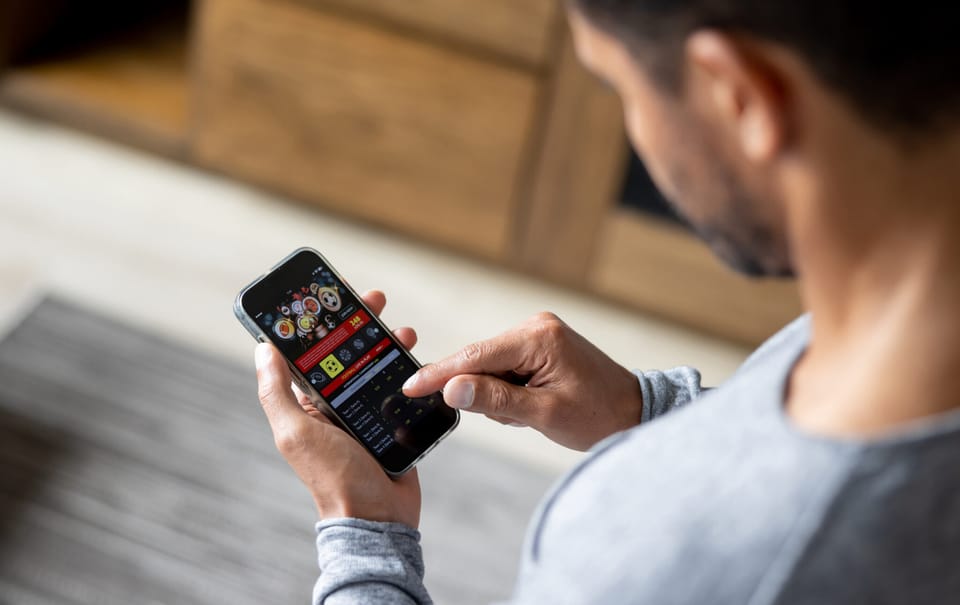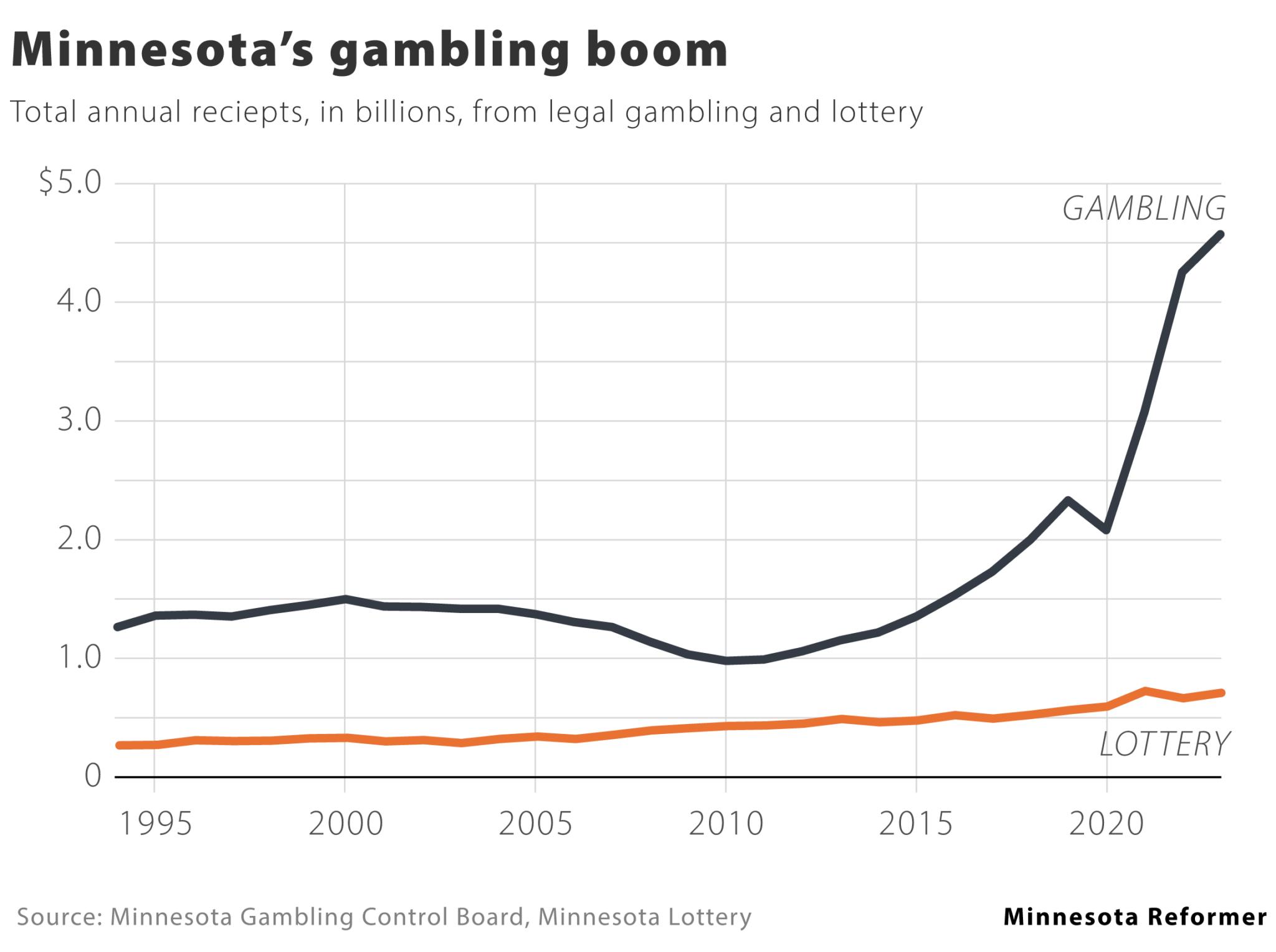Commentary: Minnesota Legislature should call a gambling help hotline before betting on mobile sports wagering

By J. Patrick Coolican, Minnesota Reformer
The sports betting scandals are piling up like the maxed out credits cards of a gambling addict.
Some youth baseball league gadfly tried to wager $100,000 on a University of Alabama baseball game while apparently trading text messages with the Crimson Tide manager, who had inside info on an injury to his starting pitcher.
Jacksonville Jaguars receiver Calvin Ridley wrote a much talked about confessional for The Players Tribune about one way he dealt with anxiety and depression: Gambling.
Late last year, more than a dozen current and former student-athletes at Iowa and Iowa State were caught up in an investigation into illegal sports betting.
J.B. Bickerstaff, head coach of the NBA’s Cleveland Cavaliers, said a gambler found his phone number and sent him threatening messages last year.
Mobile gambling allows players to make bets more or less 24 hours a day — like constantly shoving fresh supply into the pocket of a person suffering a drug addiction.
It’s so effective that even BetMGM, the gambling conglomerate’s mobile arm, launched ads last year promoting “safe” gambling, which is the equivalent of a tobacco company telling you to take it easy on the cigs for a while.
The quickly deteriorating sports gambling scene makes the Legislature’s push for legal sports betting on your phone especially curious, given that Minnesota is already on the brink of a serious gambling problem.
Minnesotans spent roughly $6.5 billion on gambling in 2022, including pull tabs, other charitable gambling, lottery tickets and gambling at tribal casinos.
Revenue from e-pull tabs, which are the slot machine(ish) devices you find at bars, has increased by nearly 1,100% (not a typo) since 2017 while paper pull tab revenue is up by 44%.

Press and politicians have gawked at this phenomenon like it’s some fascinating natural wonder, while salivating at the up-up-and-away receipts that go into the U.S. Bank Stadium account.
But the reality is much uglier: People who often can’t afford to lose are giving money to the gambling industry, as well as the state treasury and the charitable groups that rely on gamblers’ losses.
And we have lots of evidence that the people playing often shouldn’t be.
A Wilder Research report for the state Department of Human Services found that 56,000 Minnesota adults — or 1.3% — are problem gamblers, which means they’ve lost control. Another 162,000 adults, or nearly 3.8%, are “at risk.” Taken together that’s 5.1% — more than 200,000 Minnesotans.
Over one-quarter of adults in Minnesota “know someone whose gambling may be causing them financial difficulties; impacting their health; or damaging their personal, family or work relationships,” according to the report, whose authors conducted a survey of 8,512 respondents.
Among people with a high school diploma, GED or less, 8.6% are either problem or at-risk gamblers. Among people who make $30,000 per year or less, it’s 7.2%.
Given all this, I asked Rep. Zack Stephenson, DFL-Coon Rapids, who is a chief bill author, why not just wait a few years, after which a majority of America is going to wake up and ask why on earth we sold out our robust sports culture to the gambling industry.
“Because in those five years, if we do nothing, a ton of people will wager illegally on sports in Minnesota, in the shadows, with no consumer protections, no health and safety protections, and they won’t seek help as readily because they’ll be afraid they’re breaking the law, and none of the money will go to any constructive purpose like problem gambling treatment.”
Fair enough, but here’s what we don’t know: How many people are currently gambling on their phones using nominally illegal, offshore operations?
And how many more people — especially the problem demographic of 15-25-year-old young men — will gamble if Minnesota legalizes?
Stephenson said we can’t know the answer to the first question. And he acknowledges that legalization will likely lead to more people gambling, but he said whatever risk that entails would be ameliorated, because at least then we’d have revenue to devote to treating problem gambling and controls in place to keep people from losing it all.
Sen. Matt Klein, a sensible Mayo doctor carrying a Senate gambling bill, likened sports betting to the failure of cannabis prohibition before we legalized weed last year.
“We can stand out as an island (in the upper Midwest) and let people use illicit and dangerous sites, or improve upon what’s being done in other states.”
I favored cannabis legalization because prohibition was a pointless and ultimately damaging mechanism for shoving a bunch of people — disproportionately Black and low income Minnesotans — into the criminal justice system.
There are some key differences and lessons learned from cannabis legalization, however.
Most important: Although Minnesotans can buy low-dose edibles at more than 3,000 licensed convenience stores, liquor stores, smoke shops etc., they are indeed low-dose. Someone who buys as many low–dose THC edibles as they can and ingests them all is likely to be incapacitated for a day, but that’s normally the extent of the damage.
Whereas when it comes to sports gambling on a phone, a person can lose a college fund in a weekend, which is one reason people with a gambling addiction are prone to higher rates of suicide than other addictions. Up to half of people in treatment for gambling addiction have considered suicide, and about 17% have attempted suicide, according to the Nevada Council on Problem Gambling (they would know!). Addiction wrecks families, but no addiction can demolish a family’s financial condition quite like gambling.
A key figure in this debate at the Legislature is Sen. John Marty, DFL-Roseville, who is chair of the powerful Senate Finance Committee.
He’s rightly skeptical and offered up his own bill last week, filled with strict regulations on marketing and a minimum tax of 40% on net revenue from mobile sports wagering.
“Adults should be able to mostly do what they want,” he told me. “But when you bring a predatory business in, that is making money off me betting more and more and more, and every incentive is to drive profit, and you get the heavy marketing, then you see how a person goes from recreational to compulsive.”
Preliminary data indicates access and ease of use are driving up rates of problem gambling. In Michigan, calls to the gambling helpline nearly doubled between February 2020 and February 2021 after they legalized mobile sports betting there. NPR reported that calls to National Problem Gambling Helpline Network increased 45% in 2021, totaling 270,000 calls, texts and chats.
Marty worked with Sen. Jordan Rasmusson, R-Fergus Falls, on an amendment to ban in-game betting. Not so long ago, if you were in Las Vegas, you made bets before a game, and that was it.
We have a Wall Street bond firm to thank for the wondrous and appalling innovation that allows gamblers to keep losing during an entire game. You can bet on every pitch, every foul shot, every football pass.
(Cantor Fitzgerald later settled with the federal government over allegations of illegal gambling and money laundering before distancing itself from the entire business, which is a key lesson here: Everything this industry touches becomes like a bedspread at the most rundown Vegas hotel casino.)
Stephenson said he agrees that Minnesota’s law needs to provide “friction,” meaning it can’t be too easy to make one bet after another. His bill includes a provision that would require a gambler to wait three hours after depositing money into his account before he can make a bet.
This would force the gambler to think a little before he makes another bet.
When it comes to mobile sports betting, Minnesota ought to do the same.
Reformer reporter Christopher Ingraham contributed.
Minnesota Reformer is part of States Newsroom, a nonprofit news network supported by grants and a coalition of donors as a 501c(3) public charity. Minnesota Reformer maintains editorial independence. Contact Editor J. Patrick Coolican for questions: info@minnesotareformer.com. Follow Minnesota Reformer on Facebook and Twitter.

Member discussion